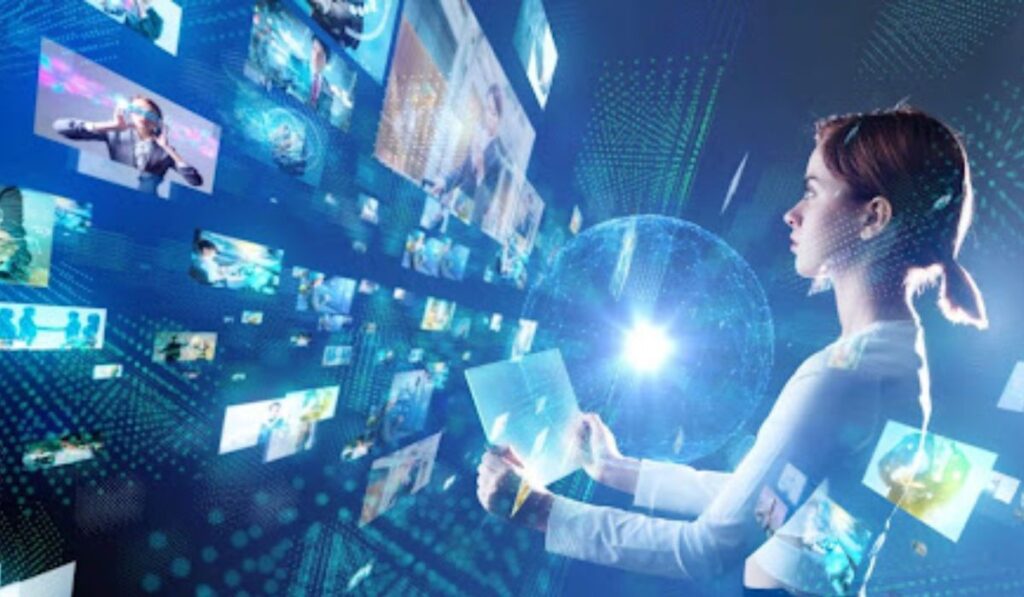Artificial intelligence is now transforming influencer marketing like never before. From data-driven insights to personalized content strategies, AI is reshaping how influencers connect with audiences and brands. AI is also helping influencers identify the right audiences, create engaging content, and measure the impact of their efforts because consumers trust 69% of influencers’ recommendations.
It also plays a key role in identifying the right influencers to partner with and measuring the effectiveness of their campaigns. With this, AI-generated influencers are gaining popularity, offering a futuristic blend of technology and creativity. This human-machine collaboration is not only enhancing influencer marketing strategies but also revolutionizing how campaigns are executed, measured, and optimized for success.
This blog post will explore the role of AI in influencer marketing, examining the benefits of this collaboration, and the role of AI social media influencers.
Role of AI in Transforming Influencer Marketing
Artificial intelligence (AI) encompasses various subfields like machine learning, natural language processing, data analytics, and computer vision. They all play a crucial role in marketing today. In influencer marketing, AI is used to identify the right influencers by analyzing audience demographics, engagement metrics, and content performance. Using AI, brands can choose influencers who are aligned with their target audience based on data analysis.
Looking ahead, AI’s potential includes creating AI-generated content, automating influencer campaigns, and offering personalized influencer matching based on real-time audience behavior. This evolution promises to make influencer marketing more targeted and efficient, reshaping the future of brand collaborations while enhancing the effectiveness and efficiency of influencer marketing strategies.
Benefits of Human-Machine Collaboration in Influencer Marketing
AI tools provide valuable insights to influence audiences helping brands design their campaigns according to user perspectives. These strong marketing tactics expand business networks and open lucrative growth opportunities. Here are some key benefits to consider:
1. Enhanced efficiency and productivity
The collaboration between humans and machines improves efficiency through the automation of tasks like data analysis, influencer selection, and performance tracking. AI-driven tools free up time for influencers and marketers to focus on creativity and strategy. It results in more personalized, data-backed campaigns that reach the right audience faster and more effectively.
2. Improved targeting and personalization
AI-powered tools can analyze vast amounts of data to identify highly targeted influencer audiences and personalize content to resonate with individual consumers. This enables brands to deliver more relevant and engaging messages, increasing the likelihood of conversions and building stronger relationships with their target audience.
3. More accurate data analysis and insights
AI algorithms can provide deeper insights into influencer performance, audience demographics, and campaign effectiveness, enabling data-driven decision-making. This allows brands to optimize their influencer marketing strategies, identify areas for improvement, and measure the return on investment (ROI) of their campaigns.
4. Cost-effective strategies
AI can help reduce the costs associated with influencer marketing campaigns through automating tasks and optimizing allocation. For example, AI-powered tools can automate influencer outreach, content scheduling, and performance tracking, saving time and money and ensuring that brands get the best value for their investment.
5. Increased creativity and innovation
AI can generate creative content suggestions and analyze emerging trends to inspire new ideas. AI-powered tools can generate unique content ideas, assist with brainstorming, and even create original content formats. It can help identify emerging trends in influencer marketing, allowing brands to experiment with innovative strategies.
What are AI-generated influencers?
AI-generated influencers are virtual personalities created using artificial intelligence and computer graphics. These digital influencers mimic human-like behaviors, engaging audiences with tailored content on social media platforms like Instagram and TikTok. Unlike human influencers, they are entirely controlled by algorithms, allowing brands to manage their image, messaging, and interactions with precise customization.
While still in the early stages, AI-generated influencers have the potential to disrupt the influencer market. They can offer brands a more cost-effective and scalable alternative to traditional human influencers.
However, their authenticity and ability to connect with audiences may be limited compared to their human counterparts. Brands use AI-generated influencers for marketing campaigns, leveraging their precision in targeting specific audiences and maintaining consistent, on-brand messaging.
AI Influencers on Social Media Platforms
With the advancement of AI, social media experts recommend users build a strong social presence. Social Followers has been helping users grow naturally since 2018, offering various social media services like real followers and authentic likes that build genuine engagement organically.
The advent of artificial intelligence has transformed various industries, and the world of social media is no exception. One of the most fascinating developments is the emergence of influencers. Here’s a look at how AI influencers are playing a key role in different social media platforms:
1. AI Influencers on Twitter (X)
Twitter, with its short-form text format, is a natural fit for AI influencers. These AI-powered accounts can tweet witty remarks, share breaking news, or engage in discussions with real users. AI influencers can also be used to promote products and services, as they are often more engaging than human influencers.
Companies can also use AI influencers to create targeted campaigns, as they can tailor their messages to specific audiences. Twitter’s algorithm emphasizes engagement, making it a valuable platform for AI influencers to reach a wider audience.
2. AI Influencers on Instagram
Instagram’s visual focus and emphasis on engagement make it an ideal platform for AI influencers. AI can be used to generate stunning visuals, create engaging stories, and personalize content recommendations. These virtual influencers use data to optimize posts, attracting higher engagement, which is why many users also choose to buy Instagram likes to boost their visibility.
Brands collaborate with AI influencers to enhance visibility, drive brand loyalty, and maintain a consistent online presence. These influencers help brands boost credibility and streamline campaigns, driving measurable results efficiently.
3. AI Influencers on TikTok
AI influencers create engaging, short-form video content on TikTok, appealing to a wider audience through trending challenges and viral videos. They can also interact with users and mimic human behavior.
These influencers have quickly gained popularity and attracted a large following due to the platform’s prominence. AI influencers can leverage TikTok’s algorithm to reach a wide audience and drive engagement, making them a valuable tool for brands to connect with younger demographics.
4. AI Influencers on YouTube
AI influencers on YouTube produce captivating videos that range from individuals to entertainment, drawing in audiences with data-driven content tailored to viewer interests. These virtual personalities provide consistency and adaptability, helping brands reach diverse demographics.
Some channels feature AI-generated gaming content while others showcase cooking tutorials and recipes. Their ability to analyze trends and preferences allows for more targeted campaigns, boosting engagement, subscriber growth, and long-term loyalty through engaging video content.
Top 3 Virtual Influencers on Social Media
Let’s look into the examples of successful virtual influencers widely popular in the world. Let’s explore their social media presence:
1. Lu do Magalu
Lu do Magalu is a groundbreaking virtual 3D influencer created by the Brazilian retail giant Magazine Luiza. She first appeared in 2009 on YouTube and has since become one of the most recognizable and influential personas in the world.
Lu is the AI fashion influencer with most followers, known for her engaging content on Instagram, which includes product reviews, unboxing videos, and software tips. She has collaborated with more than 40 brands, which makes her a valuable asset for the company and a beloved figure among Brazilian consumers. Her Instagram followers have grown to 7.1 million, making her the top 3D influencer.
2. Lil Miquela
Lil Miquela is a global pop star, the 11th virtual influencer created by the Los Angeles-based startup Brud. She was the first to go viral on Instagram and now has more than 2.5 million followers. She first appeared on Instagram in 2016 and quickly gained a massive following for her stylish outfits, catchy songs, and relatable content.
Lil has collaborated with major brands like Chanel, Prada, and Calvin Klein, becoming a prominent figure in the fashion and beauty industries. Her popularity has challenged traditional notions of beauty and identity, making her a cultural icon and a pioneer in the world of virtual influencers.
3. Shudu
Shudu Gram is the world’s first black digital supermodel, created by British fashion photographer Cameron-James Wison in 2017. She first appeared on Instagram and quickly gained a massive following for her stunning beauty and inclusive message.
Shudu has become a symbol of representation and diversity, challenging traditional beauty standards and inspiring a new generation of followers. She has collaborated with major brands like Dior, Asus and Revlon, becoming a sought-after influencer in the fashion and beauty industries. Shudu’s popularity has solidified her status as one of the most influential virtual influencers in the world.
The Future of Influencer Marketing with AI
The future of influencer marketing is poised to be dramatically reshaped by AI as it promises transformative changes and exciting opportunities. Predictions indicate that AI will increasingly play a central role in shaping marketing strategies, driving trends with sophisticated data analysis and content creation. AI has the potential to surpass them in efficiency and precision, offering highly personalized and scalable solutions.
While AI will undoubtedly play a significant role in the industry, human influencers will remain valuable for their authenticity, emotional connection, and ability to provide unique insights and experiences.
According to Forbes, working with human influencers is still 46x more profitable than AI influencers. However, as AI’s influence grows, the importance of ethical considerations cannot be overstated. Ensuring transparency, fairness, and responsible use of AI will be vital in maintaining trust and authenticity within the influencer marketing world.
Wrapping Up
The synergy between AI and influencer marketing is one of the innovative marketing trends. This human-machine collaboration brings out creativity that deepens the connection between brands and consumers. As AI continues to evolve, its ability to analyze data, create personalized content, and optimize campaigns offers many opportunities for brands.
While AI is an invaluable tool for marketers, it is not a replacement for human creativity and intuition. As AI technology advances, we can expect to see even more innovative collaborations between humans and machines, including the rise of AI influencers.
Writer Bio: Hafsa has been working as a writer and blogger for over 3 years now. She’s got a knack for writing engaging content that hits the sweet spot, especially in Digital Marketing, Big Tech Industry, and AI. When she’s not glued to her writing desk, you might find her sketching beautiful portraits or preparing her favorite coffee in the kitchen.







